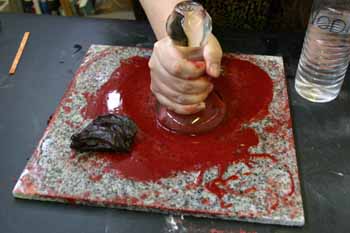Please
join our email list to be notified of the book being published and other
illumination related topics.

Unlocking
the Secrets of
Medieval Painters and Illuminators
ABOUT THE PAINTMAKING CHAPTER:
The paintmaking chapter is an incredible resource for those who would like to make paints from scratch. Focusing on the binders gum arabic, glaire, distemper and egg tempera, detailed technical information, histories, recipes and troubleshooting is presented and an easily understandable and entertaining way. This chapter will give contemporary artists back the power and longevity taken away by the industrialized manufacturing of paints.

Mulling Dragon's Blood Resin
as seen in Lapis & Gold
EXCERPT:
Preparing Pigments for Making Paint
Before making paint, it helps to create a dispersion, essentially a thoroughly mixed solution of pigment and water. By mixing a pigment with water before adding it to a binder, any difficulties can be effectively dealt with without creating lasting repercussions. For example, if a pigment such as lamp black resists mixing with water, it may be stirred in water with enough oxgall to mix. If the same pigment was mixed directly with a binder like glaire, chances are copious amounts of air bubbles will be created. In the same situation if the pigment is mixed with egg tempera, not only might air bubbles be produced, but the binder may dry before it can be adequately made into the paint! Creating a dispersion will also help an artist determine if a pigment is too grainy. Dispersions may be used in the form of a thick paste, or in a more liquid form, about the consistency of heavy cream. Pre-made pigment dispersions can be purchased, but these are usually of a much thinner consistency, e.g. like skim milk, and are not recommended for making paints with the binders described in this chapter.
PARTIAL LIST OF PAINT BINDERS COVERED:
Gums
Glaire
Distemper from parchment size (rotten & fresh)
Egg tempera
Also recipes for European & Islamic oxgall
View Other Chapters From Lapis & Gold:
The Pigment Almanac (A reference guide to pigments)
Contact us for more information
(c) 2006-9
Sybil Archibald &
Karen Gorst
All material on this website is copyrighted and may not be used without
permission.
